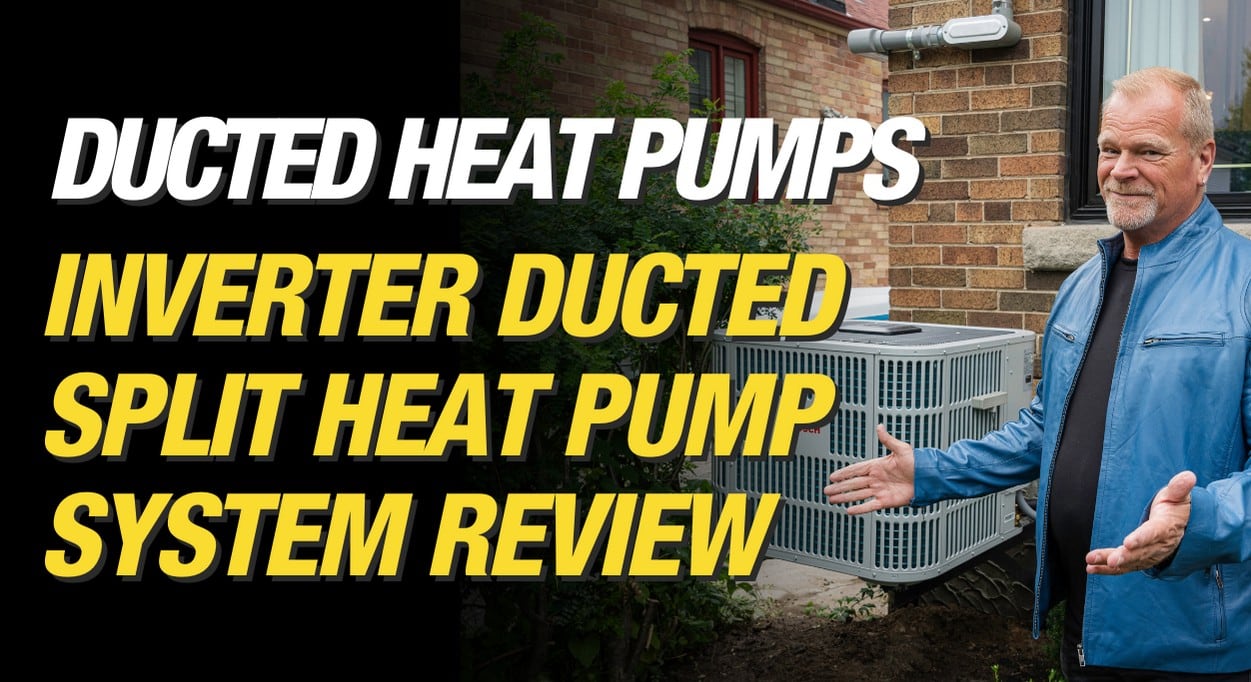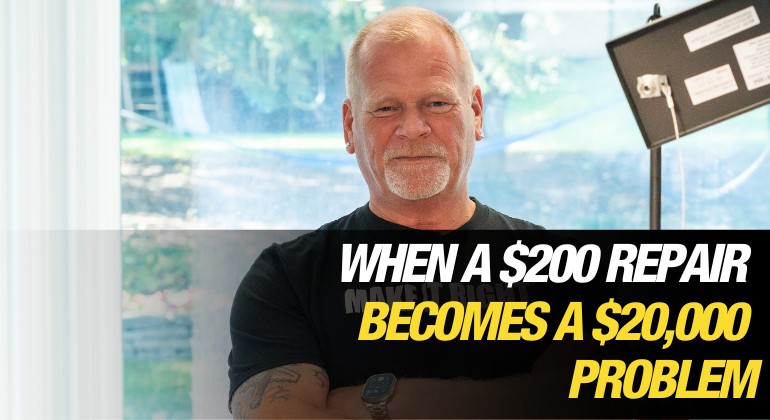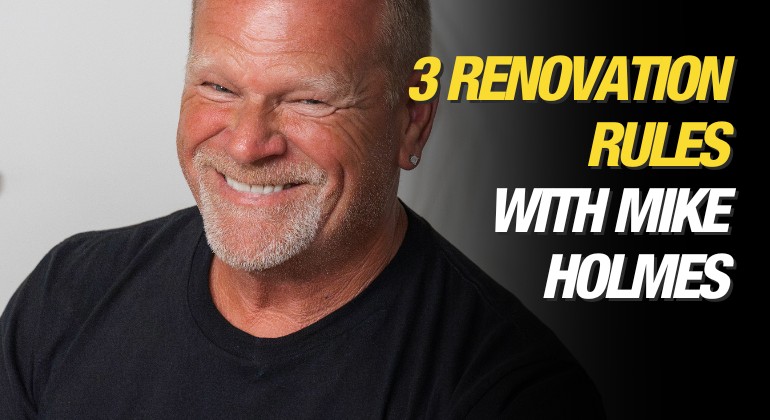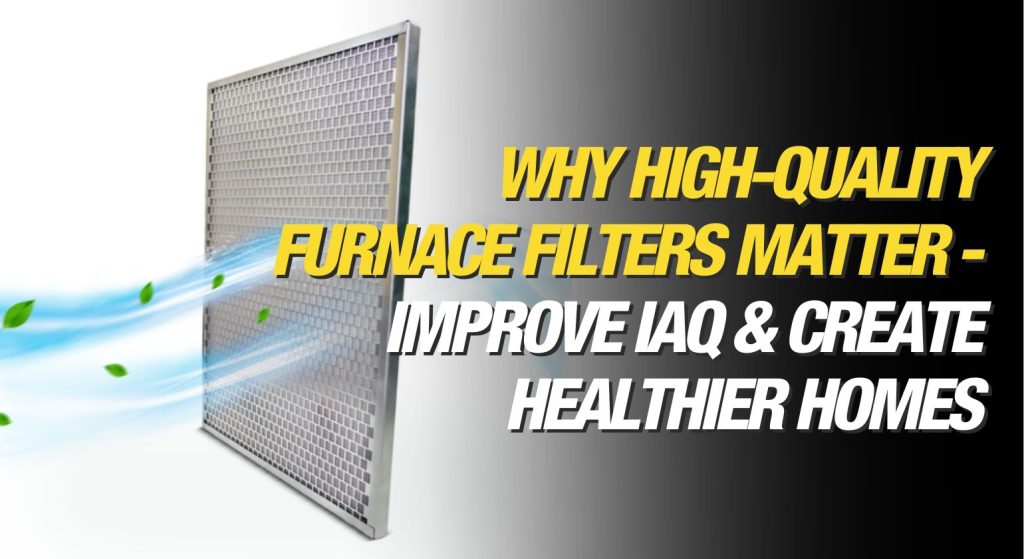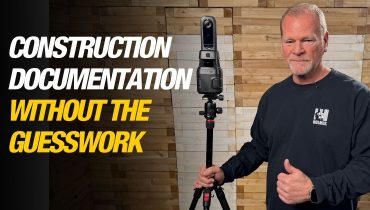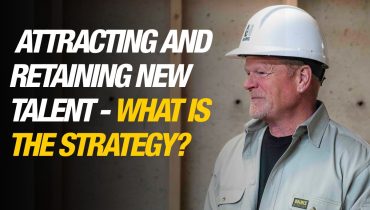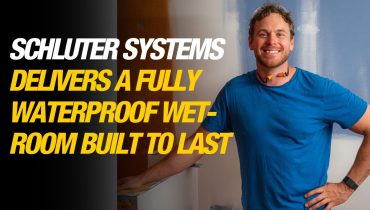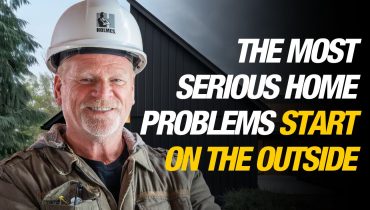I love exploring new technology—especially when it genuinely improves how we work in construction—and I recently came across one that truly impressed me, iGUIDE by Planitar Inc. In my...
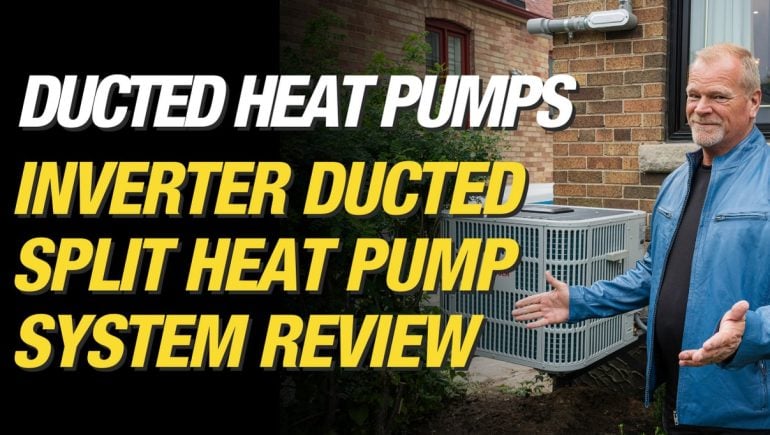
DUCTED HEAT PUMPS: Inverter Ducted Split System Review
By Mike Holmes
Mike’s Advice / Home Renovation
Wednesday, November 1st, 2023 @ 2:25pm
What You Need to Know About Ducted Heat Pump HVAC Systems
Heat pumps are an energy-efficient alternative to furnaces and air conditioners and can be used anywhere. They use electricity to transfer heat from a cool space to a warm space. So in the summer, it transfers heat from inside your home outdoors making your home cooler. In the winter the opposite happens, heat is transferred from outside indoors, making your home warmer. An inverter ducted split (IDS) system, is a type of ducted heat pump, powered by either electricity or a gas air handler. It distributes heat and cooling through ductwork connected to vents in each room.
Now I believe that some jobs are best left to the pros. Since I’m not an HVAC tech expert, I rely on the pros. Here’s a guide on inverted ducted split HVAC systems and what you need to know before buying one.
What Is a Ducted Heat Pump System?
Let’s start with the basics. An inverted ducted split HVAC system is a heating and cooling system where there is no continuous cycling of “on” and “off”. Instead, the system has a long and slow running time and maintains the thermostat setting in real-time. It doesn’t mean the system is slow to bring your home to the desired temperature, but this type of split inverter over a rotary compressor is more efficient and uses far less energy.
In many split-system air conditioners, the indoor cabinet also contains a furnace or a heat exchanger of a heat pump. In addition, split systems are economical for homes with a furnace but no air conditioner, as they can utilize the same furnace ductwork to keep your home at a comfortable temperature all year round.
How Do Heat Pumps Work?
A ducted air conditioner is made up of two units: an interior unit that is normally positioned in the ceiling and an exterior unit. The two units collaborate to complete a refrigeration cycle, with conditioned air that circulates through a network of ducts and vents.
The inverter technology allows the compressor to adjust its speed and uses the right amount of refrigerant – which optimizes comfort, while keeping noise levels low, and uses less energy.
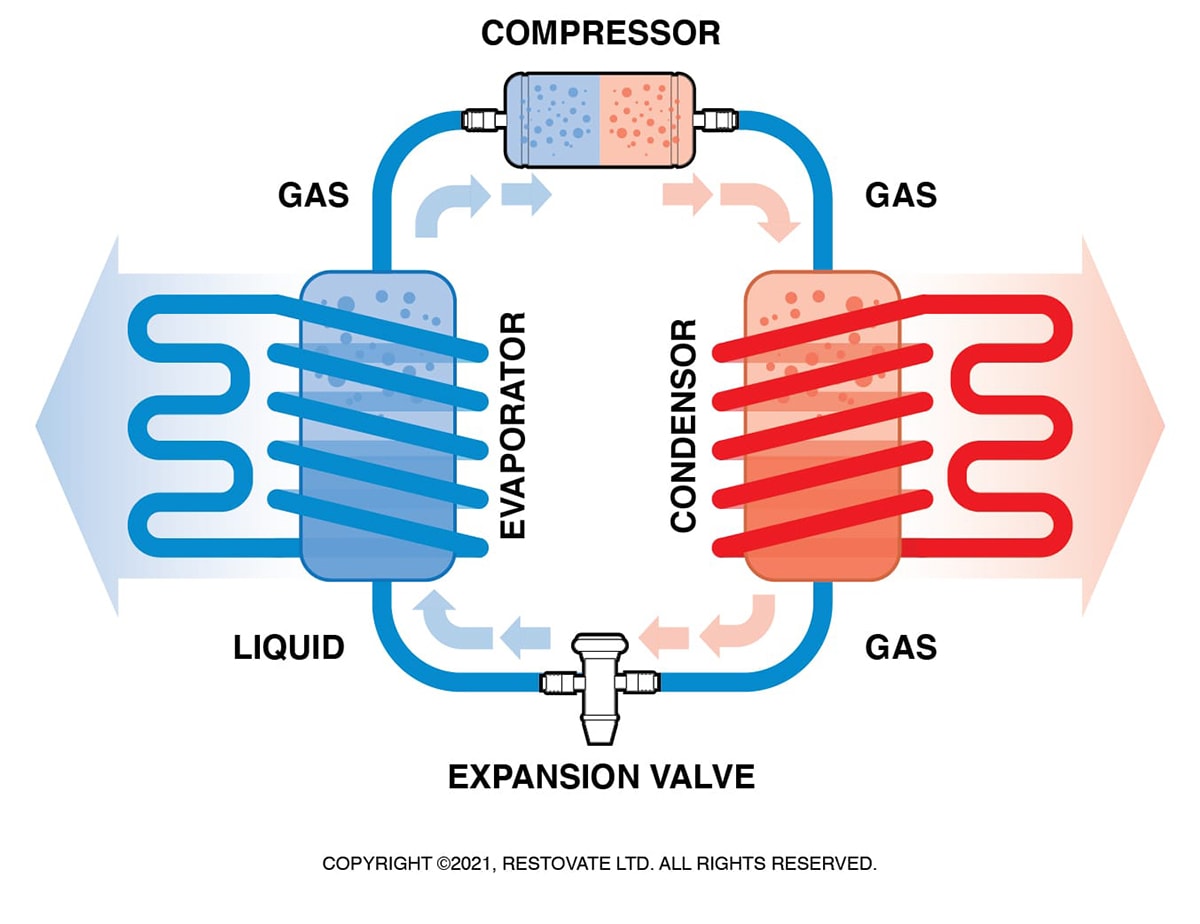
Heat pump illustration – How does a heat pump work?
RELATED:
Step-by-step process of heating and cooling
A heat pump generates heat by collecting heat from the outside air and transferring it to a coolant. The coolant is compressed, causing its temperature to rise rapidly. The coolant is then moved to the indoor unit of the heat pump, where air is pushed over it by a fan to heat it to your chosen house temperature.
During the summer, a refrigerant is used by your heat pump in cooling mode to take warm air from within your home and release it into the air outside.
How Inverter Ducted Split System Differs from Traditional HVAC Systems
A ducted AC system uses ductwork in the walls and ceiling to provide only air conditioning throughout the home. However, an inverter ducted split heat pump can also provide heating and is typically powered by electricity.
The main difference is in the compressor. In a standard air conditioner, the compressor operates until it reaches the desired or set temperature, then shuts off. It starts up again when the room gets warm, and the cool-down process starts again. This means homeowners can experience more fluctuations in the temperature throughout the day. It also uses more energy as the cooling cycle starts all over again every time the temperature drops —which means higher energy bills.
With an IDS heat pump, when an inverter is used and the room reaches its desired or set temperature, the compressor slows down so the room temperature remains constant. This means the motor doesn’t have to work as hard, it’s more energy-efficient, and quieter.
Energy efficiency comparison
IDS heat pumps are far more efficient than traditional central air conditioners, in fact, they can be up to 30-40% more efficient. A lot of energy is wasted using traditional HVAC systems with constant “on” and “off”. Inverted heat pumps only use the energy they require, not the energy they consume while cycling, which means they provide maximum comfort while using minimal energy usage.
What is the Difference Between Ducted And Ductless Heat Pumps?
Traditional ducted units use a single outside unit and a network of ducts to distribute conditioned air throughout your house.
Ductless heat pumps, also known as mini-splits, use air handlers installed inside your home to heat and cool a specific space. Mini-splits also take up less room in your home than central air conditioners and are simpler to install and maintain. However, they’re meant for smaller spaces like a sunroom, bedroom, etc. —but can’t heat or cool an entire house with just one unit.
RELATED:
Key Components of Ducted Heat Pumps
Outdoor Unit (condenser)
- Compressor
- Heat Exchanger
- Fan
Indoor Unit (evaporator) of Inverter Ducted Split System Heat Pump
- Blower Fan
- Heat Exchanger
- Air Filter
Advantages of Ducted Heat Pumps
Heat pumps both heat and cool your home all in one. They are durable, and efficient, saving up to 50% on your heating bills. Plus, they are very quiet compared to traditional HVAC systems.
- Saves money on energy bills
- Cools area down faster
- Less noisy
- Lasts longer
- Better for the environment
READ MORE:
Energy Efficiency and Cost Savings of Heat Pumps
Inverter technology is more energy efficient than a non-inverter model. Why? Because they can adjust their power consumption based on the outside temperature or the number of people occupying your home at any given time.
Modulating inverter systems simply deliver the amount of hot or cold air required to reach the target temperature – nothing more, nothing less. The power is regulated by a sensor and the set room temperature which results in less energy usage and better efficiency. An inverter can save up to 20 -40% less power than a non-inverter AC. However, the up-front costs may be more initially, but there is long-term savings.
RELATED:
Performance and Comfort of Inverter Ducted Split System
Precise temperature control and maintaining setpoints
Inverter systems’ increased compressor speed allows for a faster and more efficient cooldown or warming. Even when the outside temperature falls below freezing, inverter-driven heat pumps will self-adjust to maintain a constant interior temperature.
Traditional systems take a while to reach a comfortable temperature, while the increased compressor speeds of the inverter system enable quicker, smoother, and more effective heating and cooling.
Low noise levels and quiet operation
Inverter Ducted Split systems are also one of the quietest air-to-air heat pumps on the market. Models with 15-Seer are super quiet – 59 dGB. So quiet that your neighbours won’t hear your unit go on or off.
User interface and control options
Most modern heat pumps can be used with almost every Wi-Fi and basic thermostat on the market today and can be controlled using the manufacturers app.
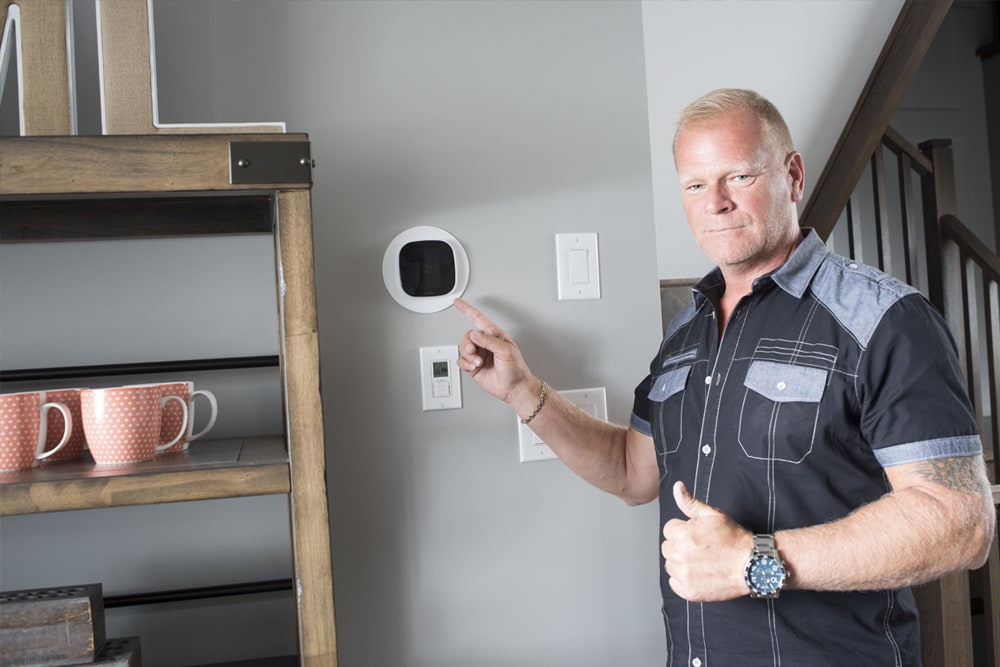
A smart thermostat can help save you money on your monthly bills.
Limitations or potential drawbacks to consider
A ducted system may only be suitable if your home has enough space for the central unit. Due to the system’s complexity, installation can take longer to complete, and the initial cost of a ducted heat pump is higher.
Still, in the long run, you will find savings from the unit’s efficiency compared to other heat sources.
Installing A Heat Pump
Ease of installation and compatibility with existing systems
The IDS Light is easy to install, it’s a non-communicating indoor and outdoor unit. But the great thing is it’s compatible with existing systems. For example, if you need to replace your outdoor unit, this unit can easily be incorporated into your existing heating and cooling system.
Indoor and outdoor unit placement options
Heat pumps should be at least 1 meter (or approximately 3 ft) from a boundary wall, a bedroom window, or any opening doors. Most heat pumps require a solid base or suspended on a platform to ensure there is enough room around them to allow for good airflow.
You should not install a heat pump in a shed.
Air-source heat pumps can be installed inside, but they must be ducted —drawing in fresh air from the outside through a duct and also exhaling fresh air to the outside through a duct. This helps ensure that they have access to all the fresh air they require.
Finding a certified HVAC technician
HVAC installation is a complicated process and needs to be done by a licensed professional. A licensed professional technician will assess your current circumstances, provide the best solution, and do the job correctly and safely. HVAC installation is NOT a DIY job.
RELATED:
Maintenance Requirements
At the beginning of each heating and cooling season, the following checks need to occur:
- Turn off the unit and disconnect the power
- Check for damaged wires
- Check for leaks
- Make sure there is nothing blocking all air inlets and outlets and clean the coils as necessary
It’s also essential that any heat pump maintenance and cleaning of the outdoor unit is performed by a qualified service technician.
Keep the area surrounding the unit clear, never use any chemicals or solvents to clean the unit, and always turn off your heat pump and disconnect the power supply before cleaning or servicing.
Maintaining IDS System
A heat pump requires a service call by a skilled maintenance professional at least once a year. During the service, the technician will need to examine a variety of things, including temperature pressure, and inspect ducts, filters, blower, and indoor coil for dirt and other obstructions.
READ MORE:
Guide to Heat Pump and Furnace Maintenance: Tips to Keep Your System Running Smoothly
Considerations before Buying
Always work with a qualified licensed technician and I’d go a step further and ensure they are a brand/manufacturer certified. This added bonus means they have been specially trained by the manufacturer and understand all the intricate details of the equipment – it also typically means there are additional warranties too.
Size and capacity requirements for your space
Inverter Ducted Split System are available in four different sizes, with capacities ranging from two to five tons. There are three systems from which to choose, and a certified technician can help you find the right sized unit based on your home’s size and needs
15 SEER IDS Light System
- The market’s first-ever 15 SEER unitary inverter system
- Delivers quality engineering at an affordable price if you don’t need a higher SEER.
- 15 SEER inverter system, the highly reliable BOVB18 outdoor unit is partnered with the new BVA15 PFC indoor air handler.
- Delivers all the benefits of an inverter system at an exceptionally affordable price.
18 SEER IDS Light System
- Affordability, efficiency and comfort
- BOVB18 outdoor unit with the unrivaled BVA20 two-stage x13 ECM-style indoor air handler for optimal heating and cooling performance.
20 SEER IDS Light System
- Combines the robust BOVA20 outdoor unit with the second-to-none BVA20 two-stage constant torque ECM air handler
- The system qualifies for maximum energy rebates and delivers peak cost savings.
Energy efficiency ratings and certifications
Traditional units frequently turning on and off create an in-rush current surge that uses more energy and puts unnecessary strain on your system. The inverter system ramps up operations gradually to prevent energy usage spikes and prolong system life.
Cost and budget considerations
Like most things, heat pumps can vary in price and performance, so its essential that you do your homework when considering one. Most brands cost between $2,500 to $10,000 to install, and the average cost is typically around $5,500.
If your home lacks ductwork or you choose a geothermal or solar-powered heat pump, installation prices can soar substantially higher – up to $30,000.
To help homeowners, there are government grants and subsidies that can help with the upgrades so be sure to check out your local options.
Available features and add-ons
Consider a heat pump with a scroll compressor, variable-speed blower, water heating options, and a Wi-Fi thermostat to maintain your home’s ideal temperature while consuming less energy.
Other features include intelligent defrosting, humidity control, and air filtration systems. These supplementary features can improve the comfort of your home while increasing the efficiency of your heat pump system. Considerations like noise level, warranty coverage, and installation costs are also important.
A forced air furnace, whether new or old, can have an add-on heat pump, often known as a ducted inverter split system.
Compatibility with smart home systems
The IDS Premium Connected offers a wireless Internet of Things (IoT) platform for contractors and homeowners, as well as in-app warranty registration, installation, and troubleshooting.
Smart home features include remote monitoring that allows for the monitoring of data for a unit even in the absence of a communicating thermostat by contractors and homeowners. This is great because you can control your home’s temperature even while you’re on vacation to make sure there are no major fluctuations that can affect your home.
Plus contractors can use apps to quickly and simply get the data they require to perform on-site installation, troubleshooting, and warranty registration.
RELATED:
Warranty coverage and customer support
Look for a comprehensive residential limited warranty that covers parts for ten years. When the heat pump was manufactured, the usual warranty covered all components. Typically, all other heat pump components ordered and installed in a licensed trained HVAC professional are covered by a one-year parts guarantee.

A home protection plan is a smart investment to protect the major systems of your house, such as heating and cooling, appliances, etc. Check out the Mike Holmes Protection Plan packages!
A lot of energy is wasted when traditional HVAC systems turn on and off. However, inverter-driven heat pumps only use the energy they require, not the energy they consume while cycling. Inverter ducted split systems, made possible by the compressor technology, offer maximum comfort without breaking the bank. And that’s Making It Right!
READ MORE:
How To Choose An HVAC System For Your Home
How To Improve Your Home Insulation
13 Best Home Products from 2022
